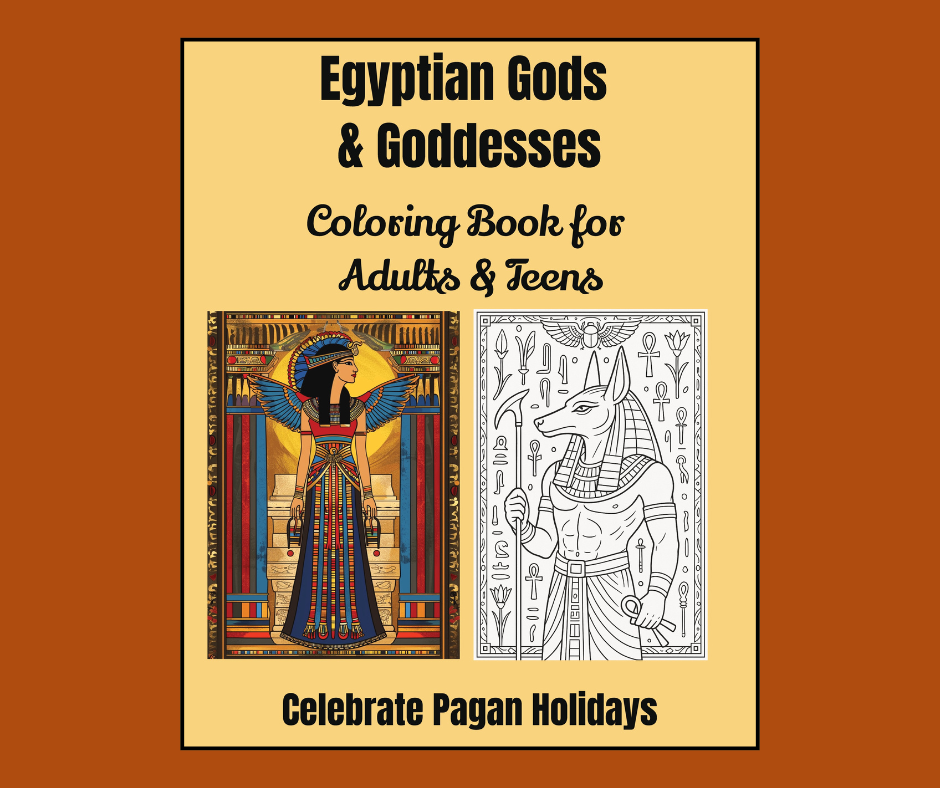Orisha Oko is the Yoruba god of agriculture, fertility, and law. 'Orisha,' is a Yoruba word that means 'god' or 'higher entity.' He is especially revered by the Yoruba people in the western region of Africa as well as the Caribbean and Brazil. Orisha Oko represents the essential connection between humanity and the land that sustains all life.
Oko is celebrated on March 22 and Monday is a day to honor him.
Domains and Attributes
Orisha Oko's influence encompasses three interconnected spheres: agriculture, fertility, and law.
Agriculture and the Earth: As the primary deity of farming, Orisha Oko governs all aspects of agricultural life. He oversees the preparation of soil, the planting of seeds, the growth of crops, and the success of harvests. As the God of Fertility the stories say that he drug his large testicles along the soil causing plants to spring forth with life.
Farmers traditionally invoke his protection against pests, drought, and disease that might threaten their crops. His blessing is considered essential for fertile soil, adequate rainfall, and bountiful yields.
Fertility and Procreation: Orisha Oko's association with fertility extends to human reproduction and the continuation of family lines. Women experiencing difficulty conceiving often seek his blessing, and successful pregnancies are attributed to his benevolence. He is a defender and protector of women.
Law and Justice: Perhaps less widely known but equally important is Orisha Oko's role as a divine judge and lawgiver. He is called upon to resolve disputes, particularly those involving land ownership, inheritance, and agricultural rights.
WHO IS ORISHA OKO?
Orisha Oko's origins trace back to the ancient Yoruba kingdoms of what is now southwestern Nigeria, Benin, and Togo. In Brazil, he is known as Ocô.
He is a close friend of Ogiyan and Shango and was married to Yemaya.
Read our article on Yemaya: Mother goddess
Bees are his messengers and spirit animals. He is symbolized by the honey bee and is seen as a hard worker and one who cares about his community.
What Does Orisha Oko Look Like?
He carries a staff and plays a bone flute while dressed entirely in white clothing. Reproductions of his staff are made and used during agricultural celebrations. Traditionally the staff was made of wood but in more contemporary times the staff is made of iron. This staff is often decorated with symbols of fertility and abundance, including cowrie shells, which represent wealth and prosperity in traditional Yoruba culture.
The staff is a phallic symbol representing fertility and protection of the farmer and their crops. The top is often adorned in beads of red and white for fertility.
Yemaya is a lunar, water goddess, the Mother of All, and a gifted diviner. Learn more about her in my video.
His colors are typically white and red, symbolizing purity and the life force respectively. White represents the pure intentions required for honest labor and fair judgment, while red signifies the vital energy that flows through all growing things. Pink is also sometimes associated with him, representing the gentle nurturing aspect of his nature.
Yoruba priests of Orisha-Oko can be men or women. As a symbol of their priesthood, they have a red and white vertical line drawn over their foreheads.
In the Caribbean, he is often represented holding two coconuts which are a symbol of his testicles and fertility.
Correspondances
Animals: Bees, dove, rooster, and goat.
Crystals and Gemstones: Turquoise, Coral was also used traditionally however purchasing coral is unsustainable as coral reefs are in danger.
Colors: Red, white
Divination: The number 7
Offerings: Fruit, dried meats, yams, and beans.
Music: Flute and drums
Tools: Farm Tools such as plow and harrow.
Add a beautiful statue to your altar.
Honor Oko
Add plants and a bowl of the earth to your altar to worship Oko.
Add a statue of him to your garden
Place cowrie shells on your altar
He loves flute music and dancing with drumming
Pray to Oko when you or your partner, are attempting to become pregnant.
Pray to Oko when you are trying to improve your diet and eat healthier
Cook him some yams or sweet potatoes
Celebrate With Food
The yam holds special significance as Orisha Oko's sacred food, representing sustenance, fertility, and the fruits of honest labor. In many ceremonies, yams are offered to him as both thanksgiving for successful harvests and petitions for future abundance. Other sacred items include palm wine, which represents celebration and community gathering, and white flowers that symbolize purity of intention.
Lilith Dorsey has a fabulous book Orishas, Goddesses, and Voodoo Queens: The Divine Feminine in the African Religious Traditions that taught me so much!
Festivals and Rituals
The worship of Orisha Oko involves various ceremonies throughout the agricultural year, each designed to maintain harmony between human activity and natural cycles. The most elaborate of these is the annual Orisha Oko festival, typically held at the beginning of the farming season in March.
During these festivals, communities gather to present offerings of yams, palm wine, and other agricultural products. Ritual dances reenact the cycles of planting, growing, and harvesting, while drummers play specific rhythms believed to invoke Orisha Oko's presence. Priests and priestesses, known as babalorishas and iyalorishas, lead elaborate ceremonies that include divination to determine the orisha's wishes for the coming season.
Individual devotional practices include daily offerings of water, food, and prayers at personal or family shrines. These practices maintain ongoing communication with Orisha Oko and demonstrate gratitude for his continued protection and blessing. Many devotees also observe specific taboos, such as avoiding certain foods or activities during sacred periods, as expressions of respect and devotion.
I have a lot of videos on Egyptian deities but this video is a good overview.
ORISHA OKO'S ORIGIN STORY
According to an ancient Yoruba legend, Orisha-Oko was initially the chieftain of the city of Irawo, where he was a successful farmer and community leader. When he died his body disappeared and a staff was left in his field.
The people of the village realized he was not human but a deity.
Role in Yoruba Society
Traditionally, Orisha Oko held a central position in Yoruba agricultural communities. His worship was integral to the agricultural calendar, with specific festivals and rituals marking important farming seasons. The most significant of these was the annual yam festival, where communities would gather to offer the first fruits of their harvest to ensure continued prosperity.
Farmers would typically maintain small shrines to Orisha Oko at the edges of their fields, where they would make regular offerings and seek his blessing before beginning important agricultural work. These shrines served as focal points for both individual devotion and community gathering, reinforcing social bonds through shared spiritual practice.
In matters of justice, traditional courts would invoke Orisha Oko's name when dealing with disputes involving land, crops, or agricultural contracts. His presence was believed to ensure that verdicts reflected truth and fairness rather than personal bias or corruption. This judicial aspect made him particularly important in maintaining social order within farming communities where disputes over land rights and crop ownership could threaten community harmony.
A group of Santería practitioners performed the Cajón de Muertos ceremony in Havana in 2011. Photo by Jorge Royan
Santeria
Santeria also called Regla de Ocha, is a related religion practiced in the Caribbean and the southern United States. They are descended from the Africans forcibly relocated during the slave trade.
They brought their culture and religion to the Americas where it merged with Catholicism and spirituality.
Santeria worships multiple gods from the Yorusha culture and is popular in Cuba and Puerto Rico.
Contemporary Relevance and Honor
In our modern world, where many people live far removed from agricultural life, honoring Orisha Oko might seem less relevant. However, his principles remain deeply applicable to contemporary challenges, particularly as humanity grapples with environmental degradation, food security, and social justice issues.
Environmental Stewardship: Orisha Oko's emphasis on working in harmony with natural cycles offers insight when addressing climate change and environmental destruction. His teachings promote sustainable agricultural practices, respect for natural resources, and recognition of humanity's dependence on healthy ecosystems.
Modern devotees can honor him by supporting sustainable farming, reducing waste, and advocating for environmental protection.
Food Justice: In a world where many lack access to nutritious food while others waste enormous quantities, Orisha Oko's principles of fair distribution and community responsibility provide a spiritual framework for addressing food inequality.
Supporting local farmers, participating in community gardens, and advocating for food justice policies align with his values of ensuring no one goes hungry.
Social Justice: Orisha Oko's role as divine judge translates into contemporary advocacy for fair legal systems, honest governance, and protection of the vulnerable. His emphasis on truth and impartiality provides spiritual grounding for those working to reform unjust systems and create more equitable communities.
Regular meditation on Orisha Oko's principles of patience, hard work, and fairness can provide spiritual guidance for navigating modern challenges. His example encourages finding dignity in honest labor, regardless of its nature, and maintaining integrity in all dealings with others.
Author, Imani Williams, is a college student studying social work. She has been a kitchen/cosmos witch for four years. Imani is very interested in divination and spell casting.








